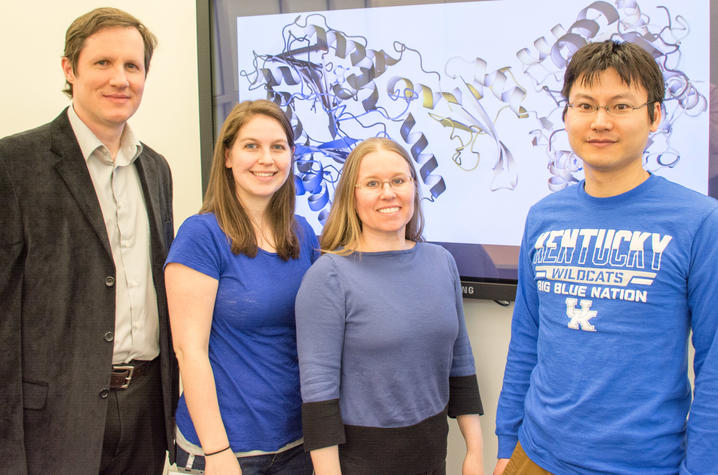UK Scientists Uncover the Tools Nature Uses to Make Medicines

LEXINGTON, Ky. (March 29, 2018) – New findings from University of Kentucky researchers published in Nature Chemical Biology help reveal how nature makes complex chemicals with anticancer properties.
A collaborative effort between the laboratories of Sylvie Garneau-Tsodikova and Oleg Tsodikov at the UK College of Pharmacy investigate biochemical reactions that generate natural products. Shogo Mori and Allan Pang, post-doctoral scholars in Garneau-Tsodikova and Tsodikov’s labs, were leading co-authors of the study.
Natural products that are made by bacteria, plants, and fungi have complex chemical structures and numerous medicinal properties, making them effective as pharmaceuticals, but notoriously difficult to recreate in a lab.
“We tried to figure out why nature is so effective at providing us with certain medicinal solutions,” said Mori.
To decipher how nature makes molecules with medicinal properties, over the past 12 years, Garneau-Tsodikova and Tsodikov have worked together to uncover mechanisms of enzymes that generate these natural products.
“In our labs, we turn to nature for inspiration and solutions,” said Garneau-Tsodikova, associate professor of pharmaceutical sciences. “No matter how complicated the project, we’ve been committed to finding a solution. It looks like our hard work has paid off.”
Their labs demonstrated that a seemingly simple chemical modification is performed by a large multifunctional enzyme. This enzyme does two things: it activates an amino acid and then modifies it. The group also uncovered the molecular structure of the multifunctional enzyme, which explains these reactions and will now allow scientists to visualize these chemical transformations at an atomic level.
“The atomic view of this fascinating natural mechanism will now allow us to engineer chemical machines that would perform similar synthetic reactions for a wide variety of molecules to enhance their natural medicinal properties,” said Tsodikov.
Kip Guy, dean of the UK College of Pharmacy, praised the team for their diligence and persistence in searching for answers.
“The type of ingenuity and patience it takes to go after something for 12 years, committed to finding an answer, is one of the reasons we’re ranked as a top-ten institution,” Guy said. “Our people are committed to elevating patient care all the way from the lab bench to the patient bedside.”
Garneau-Tsodikova and Tsodikov hope to implement their findings and synthesize similar molecules that can be used as improved drugs. With about half of pharmaceuticals originating from natural products, these findings may have a significant impact on increasing the effectiveness and safety of new drugs and addressing our resistance to them.
Other study authors include Taylor Lundy and Atefeh Garzan from the laboratory of Garneau-Tsodikova. This study was funded by the National Science Foundation and the College of Pharmacy at the University of Kentucky.




